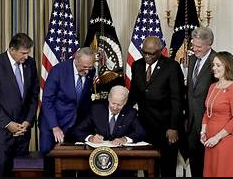Joe Biden’s Inflation Reduction Act is laudable, but decades of decline cannot be reversed in a single presidential term.
There is a well-known saying in the world of manufacturing: once an industry leaves, it won’t return. It’s the Humpty Dumpty of economics. This reality explains why the Germans, who have a long history of industrial strength, have been fighting hard against deindustrialization. The US and the UK, however, abandoned industrial dominance decades ago. Now, the Biden administration hopes to revive American manufacturing, using the Inflation Reduction Act (IRA) as a key tool, with its $370 billion program in green subsidies. But this strategy may underestimate the scale of the challenge.
Jake Sullivan, the US national security adviser, is the intellectual force behind this initiative. It highlights the shifting nature of modern geopolitics, where foreign policy increasingly shapes domestic economic strategies. Sullivan has pointed out the erosion of America’s industrial base as one of the motivations behind this economic revival. The other significant factor driving this policy shift is, of course, China, which is seen as both an economic and geopolitical rival.
While the ambition of the Inflation Reduction Act is commendable, it’s important to recognize the magnitude of the task. Decades of industrial decline cannot be reversed in a single presidential term. Rebuilding entire sectors of industry is not only a logistical challenge but also a deeply political one. The policies that seek to revive manufacturing risk ignoring the complex realities of global supply chains, labor markets, and technology.
Instead of focusing on attempting to revive industries that have already left, the West might be better off strengthening its economic alliances. In an interconnected world, economic partnerships and strategic collaborations often outweigh attempts at self-sufficiency. By focusing on creating robust economic ties with other democratic nations, the West can position itself more effectively to address the economic challenges posed by China and other competitors.
There is also the question of whether the massive subsidies under the Inflation Reduction Act can generate sustainable economic growth. Such subsidies can stimulate specific sectors, but without a broader, long-term strategy that includes innovation, labor market reform, and education, the effects may be short-lived.
Ultimately, the emphasis should be on creating a more resilient and integrated global economy. The West should seek to build coalitions with other democratic nations to strengthen its position in the face of rising geopolitical and economic competition. Rather than trying to rebuild an industrial empire that may no longer be feasible, the West should focus on maintaining its competitive edge through alliances and shared innovation.

